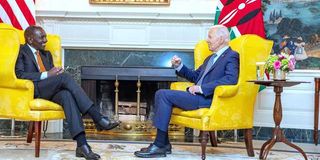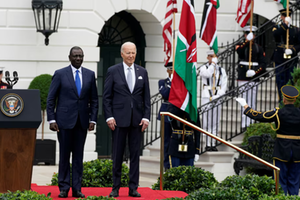
Presidents William Ruto (Kenya) and Joe Biden (US) hold talks at the White House, Washington, DC.
If President William Ruto’s State Visit to the United States of America was a roaring success, a large share of the credit must go to his ‘Ambassador Extraordinary and Plenipotentiary to Washington’, Margaret Cushing Whitman.
Although officially the US ambassador in Nairobi, Meg Whitman has, in two years, achieved much more in projecting Kenyan interests in her home country than, collectively, our Cabinet secretaries responsible for Foreign Affairs, Defence, Trade, National Treasury, Agriculture, Internal Security, Education, Trade, Investment, Tourism, Roads, Information and Communications Technology, Environment and many other critical dockets. That’s more or less the entire Cabinet.
President Ruto becoming the first African president to earn a state visit to the US since 2008, the special security partnership conferred by President Joe Biden, the pledges of support in so many sectors as well as deals struck with private corporations are a testament to the success of the historic mission.
Private sector
They are also confirmation of the extensive planning ahead of the trip, much of which seems to bear Ms Whitman’s thumbprint in her government links and also private sector connections as a top Silicon Valley executive prior to her diplomatic posting.
The trip served as renewal of Kenya’s traditional ties to America and also affirmed President Ruto’s emergence as a key US point man in Africa.
President Ruto will, no doubt, be feeling puffed-up from the economic and diplomatic dividends of the junket and the signs of his expanding recognition as an important African leader. However, he cannot ignore perceptions bound to gain traction that he is no more than an over-enthusiastic American lackey.
I found it disturbing reading a report in a US paper that Ms Whitman has our president on virtual standby to take her calls at any time and will often put him on speakerphone while engaging her American business and diplomatic colleagues.
The global geopolitics of today indicate a sort of return to the Cold War days, with the US scrambling to contain growing Russian and Chinese influence in Africa and wider afield. The collapse of the old Soviet Union in the early 1990s made USA the sole superpower and also saw it assume the role of global policeman.
Grew complacent
America, however, grew complacent, failing to see the emergence of China as, first, an economic colossus and now a military power under President Xi Jinping. Russia’s rebound under President Vladimir Putin, who is deliberately moving to militarily regain some of the territories lost with the collapse of USSR, also seems to not have been predicted by Washington.
The reality is, the US is not the centre of the world; it is not the unchallengeable ‘globocop’. It loves projecting muscle but has suffered humiliating defeats in nearly all the major military misadventures it ventured into since the Second World War.
There may well be clear gains from the US trip, especially viewed from the perspective of Kenya’s status as a regional economic and security linchpin and communications hub. We have a great opportunity to leverage on US recognition of our strategic placing. However, we must guard against being reduced to a US pawn on the global chessboard. We can enjoy close relations with the US but must not agree to be used in Uncle Sam’s game to ‘counter’ Russia and ‘contain’ China; they can be our friends and partners, too.
* * *
Mombasa County Governor Abdulswamad Shariff Nassir and his Kilifi colleague Gideon Mung’aro have issued orders prohibiting the entry, distribution and consumption of the stimulant leaf muguka within their respective domains.
Those could be commendable efforts geared towards saving the citizens, particularly the youth, from zombification wrought by heavy consumption of the intoxicant. It is the responsibility of those in authority to safeguard the health and safety of their people and society as a whole.
However, the Mombasa and Kilifi bans raise serious questions. Muguka, and its close cousin, miraa, are not illegal drugs. They are not prohibited in Kenya under the Narcotic Drugs and Psychotropic Substances (Control) Act. They are recognised by the relevant national government ministries as legitimate agricultural crops and trade produce.
Even if the prohibitions are fully supported by the political establishments, the legal and administrative routes may be open to challenge. For instance, we all know that cigarettes and alcohol, for example, are harmful if consumed in excess. But they are not illegal.
What would happen if a county government decided to ban tattoos, dreadlocks, mini-skirts or exposed faces? And what if the county government decides to impose a certain religion as the official faith and outlaw observance of all others?
[email protected]. @MachariaGaitho







